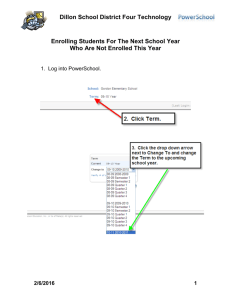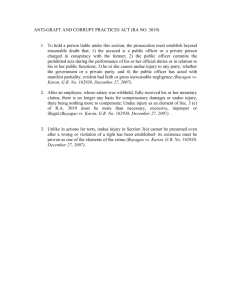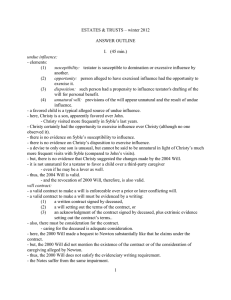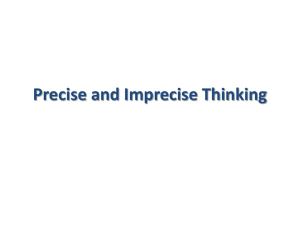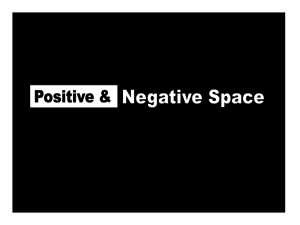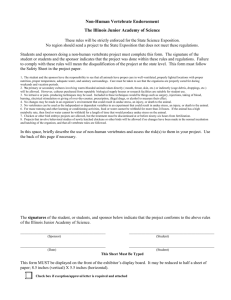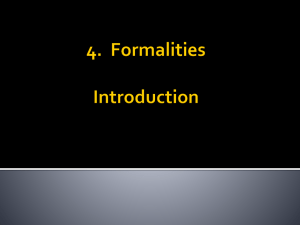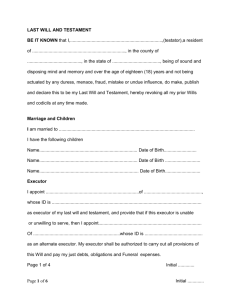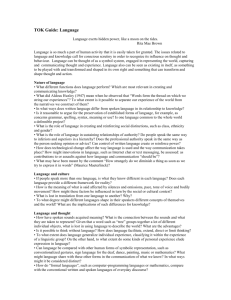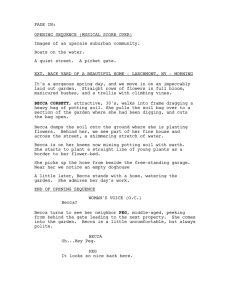Question 1 Issue Outline - Empire College | Student Home
advertisement
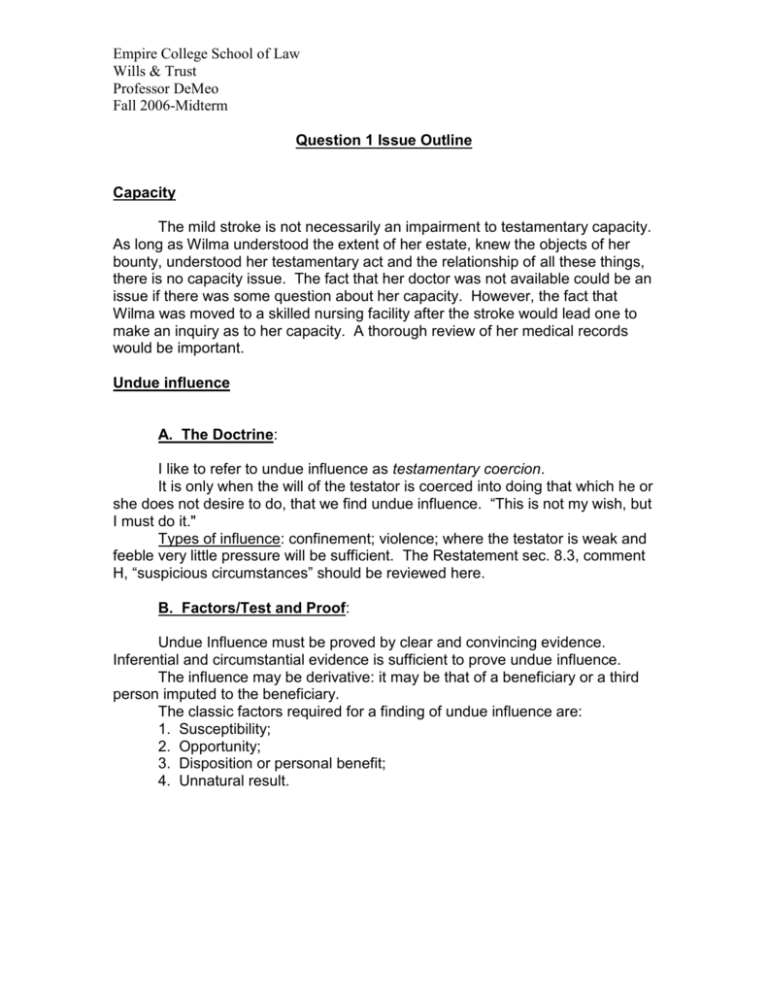
Empire College School of Law Wills & Trust Professor DeMeo Fall 2006-Midterm Question 1 Issue Outline Capacity The mild stroke is not necessarily an impairment to testamentary capacity. As long as Wilma understood the extent of her estate, knew the objects of her bounty, understood her testamentary act and the relationship of all these things, there is no capacity issue. The fact that her doctor was not available could be an issue if there was some question about her capacity. However, the fact that Wilma was moved to a skilled nursing facility after the stroke would lead one to make an inquiry as to her capacity. A thorough review of her medical records would be important. Undue influence A. The Doctrine: I like to refer to undue influence as testamentary coercion. It is only when the will of the testator is coerced into doing that which he or she does not desire to do, that we find undue influence. “This is not my wish, but I must do it." Types of influence: confinement; violence; where the testator is weak and feeble very little pressure will be sufficient. The Restatement sec. 8.3, comment H, “suspicious circumstances” should be reviewed here. B. Factors/Test and Proof: Undue Influence must be proved by clear and convincing evidence. Inferential and circumstantial evidence is sufficient to prove undue influence. The influence may be derivative: it may be that of a beneficiary or a third person imputed to the beneficiary. The classic factors required for a finding of undue influence are: 1. Susceptibility; 2. Opportunity; 3. Disposition or personal benefit; 4. Unnatural result. Empire College School of Law Wills & Trust Professor DeMeo Fall 2006-Midterm C. Evidentiary Enhancements: Is there a confidential relationship? Yes, the power of attorney created a fiduciary relationship. Disqualified drafter? If so, what result? D. Result: Who gets what? What disposition is affected? We go back to a prior will if undue influence is found and then distribute the affected portion of the estate according to the prior will. Lipper v. Weslow (1963) Texas In our test question here, Jasmine is a lawyer and the primary beneficiary. The California rule in Probate Code section 21350 would seem to invalidate the gift to Jasmine in the codicil. Reference paragraph nine of the Lipper will: here is a red flag bright and obvious: any time that the word "influence" is mentioned in the will, there is sure to be a contest. In addition to this problem there's a lot of legalese in this paragraph. Are these her words? In Lipper the contestants must prove that the son substituted his mind for the testators. It is not enough for the contestants to claim presumptions such as the confidential relationship, and other elements of this test. The contestants must go further and prove that the will of the testator was substituted for the will of another. In other words, the free agency of the testator was taken away. Don't just stop at satisfying the four elements or factors of undue influence, you must also show and prove with sufficient evidence, incidental or circumstantial, that the will of the testator was overcome. You must show presence of the factors and you must meet the test. Is this an unnatural result? It seems that Jasmine is the only one caring for Wilma. And…by the way…what is Wilma’s intent? Does the disposition seem to be fair, thoughtful and natural? Empire College School of Law Wills & Trust Professor DeMeo Fall 2006-Midterm Question 2 Issue Outline A. Interpretation/Construction There is misdescription in the gift to Becca and to Romy. What do the actual words say? Is there a patent ambiguity? Latent Ambiguity? Mistake? Scrivner’s error? Can you get extrinsic evidence in to show Dillon’s intent? Factually, there is no Planet Zeta, so there is no real property there. Is the language defective on its face? Yes, it is. Everyone knows there is no Zeta. However, what can Becca do to get the property on Beta? Under the traditional rule regarding ambiguity, nothing. The ambiguity is patent. But, is this really an ambiguity or a mistake? The mistake is obvious on its face, and under the modern majority rule extrinsic evidence is admissible to correct the mistake. This is what Becca will aruge. Obviously, the Foundation will argue that the language is unambiguous, and that under the traditional, now minority rule, you cannot go outside the face of the document for evidence of the Testator’s intent. There is not Zeta, there is no devise to Becca. Becca will want to talk to the drafter of the will to determine whether the “Z” in Zeta was a typo where a “B” for Beta was intended, or whether Dillon was just confused that day. The Post Street address is not ambiguous until one tries to make the distribution of Dillon’s home to Romy. There is no Post Street property in this estate, but there once was. We have a latent ambiguity here, so extrinsic evidence is admissible. There is a home. And, arguing the modern rule, Romy should demand the “home” of Dillon. She will argue that the address was merely additional information, superfluous, and not necessary to fulfill Dillon’s express intent, which was to give the “home” to Romy. The Foundation will argue contra. B. Spousal Rights/Community Property With a spouse in the mix, there will be community property issues and separate property issues. There seems to be at least some community property and Weather will be entitled to it. She probably won’t get any separate property because Dillon can do what he wants with it. Weather would be entitled to family allowance during the estate administration and family homestead from the Sutter Street property since she once lived there as a community spouse. C. Gift to Dog or Animal Care Trust The gift to the Foundation looks to be a trust for the dog’s care then an Empire College School of Law Wills & Trust Professor DeMeo Fall 2006-Midterm outright gift to the Foundation. This is not a gift to the dog outright, so it is valid under California Law. See Probate Code section 15212. The Foundation will have to care for the dog, then, when the dog dies, it will get its devise.
